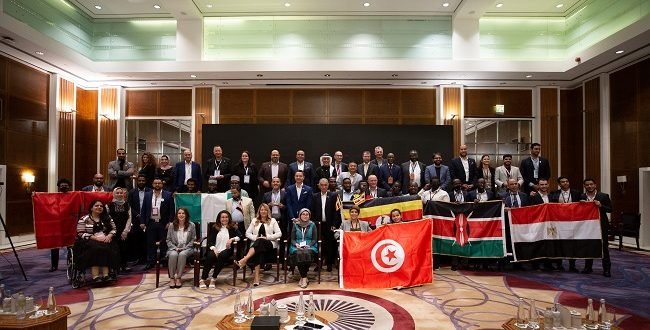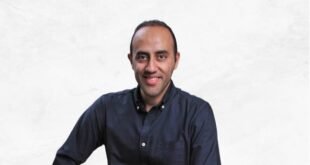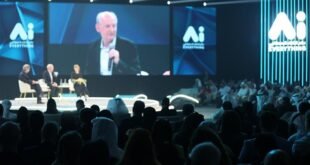IEEE TEMS and Bunya Group -the official sponsor of the Africa IoT and AI Challenge- which is the leading group in the field of communications infrastructure and digital transformation in Egypt, the Middle East, and the African continent, and the IEEE Africa Council and WAKANDAI, have announced for the final results of Africa IoT & AI Challenge 2021, where each Nigeria, Morocco, and Egypt won the first places
In the graduation projects category, Nigeria ranked first, Uganda ranked second, Morocco ranked third, and in the STEM school’s category, Egypt was the only one in first places, In the start-up category, Morocco came first, Kenya ranked second, and Egypt and Uganda shared third place.
This took a place on the activities of the Global Conference on Artificial Intelligence and the Internet of Things (IEEE GCAIoT 2021) in its fifth edition, which will be held under the slogan Societal Impacts of Digital Disruption in Dubai, United Arab Emirates, from 13-16 December, at the Jumeirah Emirates Towers Hotel, This is done with several organizing partners, most notably the University of Dubai, IEEE TEMS, IEEE Region8, and The Global innovation & Entrepreneurship (GIE), a leader in the field of innovation and entrepreneurship programs and initiatives in the Middle East and North Africa region.
Twenty-one teams from 6 African countries participated in the challenge, namely, Nigeria, Kenya, Uganda, Egypt, Tunisia, and Morocco, and they were divided into two main axes of the challenge, which are graduation projects for university students and startups in the fields of IoT and AI.
Commenting on this statement, Eng. Mohamed Aboud, Chair of IEEE TEMS Regional Activities, MENA Region, said: We are proud of the results achieved by African youth in the Africa IoT & AI Challenge, as the demand for participation and competition reflects the enormous capabilities For human cadres in the African continent and their ability to lead the future development process and achieve the ambitious visions of Governments in digital transformation initiatives.
For his part, Eng. Ahmed Mekky, the Chairman and CEO of Benya Group , declared, The group’s sponsorship to this imperative challenge is based on our keenness to support striving calibers in the IT & Technology field and our belief in the ability of the qualified calibers to adapt to technology and use it efficiently. This comes in parallel with the huge acceleration in technical developments that requires training and continuous updating to all parties. This will enable the digital system to be the main driver that Egypt relies on its plan towards digital transformation.
Eng. Ahmed Mekky pointed out that Benya Group is keen to develop the skills of young calibers, and support their innovative projects in Egypt and various countries of the African continent. The group aims to build the capabilities of students, whether at the undergraduate or pre-university levels, as well as support entrepreneurs with creative ideas in the fields of Internet of Things, and artificial intelligence, especially in light of the Egyptian government’s orientation to support the field of entrepreneurship, which requires joint efforts from all concerned parties, whether governmental or private, to support this path, which is the main pillar of the global economy in the upcoming period.
On his side, Eng. Ahmed El Beheiry, Founder & Managing Director of WAKANDAI stated, WAKANDAI being the founding and managing partner of IEEE Africa IOT & AI challenge is a manifestation of its vision
delivering IOT & AI solutions & applications to African communities, thus we are proud of what has achieved & hopeful for Africa economy future growth from IoT & AI .
It is noteworthy that the Africa IoT & AI Challenge is an integrated capacity building program for high school and university students and entrepreneurs, with ideas and emerging technology companies on the African continent, by supporting and sponsoring graduation projects as well as embracing creative and innovative entrepreneurs, owners of ideas and emerging technology projects. And in partnership with many governments and regional, local, and international institutions.
 التكنولوجيا وأخبارها بوابة مصر لأخبار تكنولوجيا المعلومات والإتصالات وفي أفريقيا كما تعتبر مصدر رئيسي للمعلومات حول تكنولوجيا المعلومات والاتصالات والفرص الاستثمارية المرتبطة بالاقتصاد الرقمي في المنطقة بالكامل
التكنولوجيا وأخبارها بوابة مصر لأخبار تكنولوجيا المعلومات والإتصالات وفي أفريقيا كما تعتبر مصدر رئيسي للمعلومات حول تكنولوجيا المعلومات والاتصالات والفرص الاستثمارية المرتبطة بالاقتصاد الرقمي في المنطقة بالكامل







